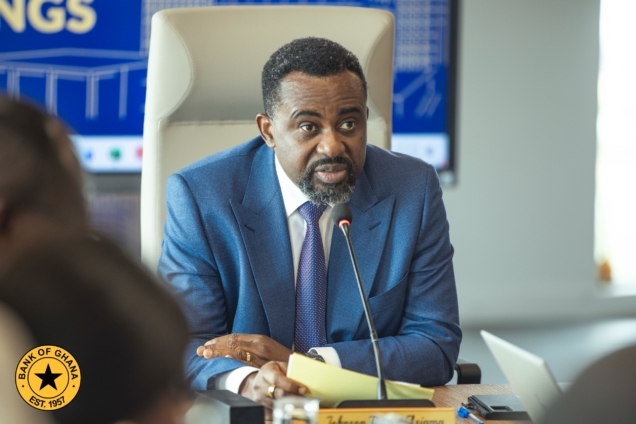
Audio By Carbonatix
The Governor of the Bank of Ghana, Dr. Johnson Asiama, has admitted that the path ahead in restoring macroeconomic stability remains complex and fraught with risks, both global and domestic.
According to him, this underscores the importance of today’s Monetary Policy Committee (MPC)meeting and the decisions they are set to make.
Giving opening remarks ahead of the three-day MPC meeting, Dr. Asiama said since its last meeting, there had been further moderation in inflation, citing the Ghana Statistical Service's April 2025 inflation.
He, however, noted that the inflation rate is still well above the medium-term target band of 8 ± 2%, breaching the upper consultation band of 19%.
In March 2025, the MPC responded decisively to the inflation outlook by raising the policy rate by 100 basis points to 28%.
The Governor said preliminary evidence suggests this action has contributed to dampening inflation momentum.
“Importantly, the cedi has appreciated sharply by nearly 19% between April and May 2025, helping to ease imported inflation pressures and restore public confidence. The appreciation reflects a combination of factors, including prudent monetary policy, improved market sentiment, and external sector gains”, he explained.
“We are also seeing encouraging signs of macroeconomic progress. Ghana has reached a Staff-Level Agreement with the IMF on the Fourth Review of the ECF [Economic Credit Facility] Programme, and although some prior actions remain outstanding, the trajectory is clearly positive. The recent S&P upgrade of Ghana’s sovereign rating from Selective Default to CCC+ further affirms this progress. External reserves have strengthened, the trade balance has improved, and consumer and business confidence indices are rising steadily”, he added.

The Governor, however, said significant challenges persist, mentioning the inflation outlook, while improving, remains vulnerable to second-round effects, food supply constraints, especially from northern Ghana and the Sahel and external price shocks, particularly given volatile global commodity markets.
He pointed out that geopolitical tensions and evolving global trade dynamics, including the recent US-led tariff disputes, have heightened market uncertainty and could affect commodity prices, exchange rates, and financial flows in emerging markets including Ghana.
Latest Stories
-
NAIMOS has failed in galamsey fight; it’s time for a state of emergency – DYMOG to President Mahama
29 minutes -
Mahama to open African Court judicial year in Arusha, mark 20th anniversary
35 minutes -
Ghana begins partial evacuation of Tehran Embassy as Middle East tensions escalate
50 minutes -
EPA tightens surveillance on industries, moves to cut emissions with real-time monitoring system
1 hour -
Police conduct show of force exercise ahead of Ayawaso East by-election
3 hours -
Ghana launches revised Early Childhood Care and Development Policy to strengthen child development framework
3 hours -
AI to transform 49% of jobs in Africa within three years – PwC Survey
3 hours -
Physicist raises scientific and cost concerns over $35m EPA’s galamsey water cleaning technology
4 hours -
The road to approval: Inside Ghana’s AI strategy and KNUST’s leadership
4 hours -
Infrastructure deficit and power challenges affecting academics at AAMUSTED – SRC President
4 hours -
Former US diplomat sentenced to life for abusing two girls in Burkina Faso
4 hours -
At least 20 killed after military plane carrying banknotes crashes in Bolivia
4 hours -
UK reaffirms investment commitment at study UK Alumni Awards Ghana 2026
5 hours -
NCCE pays courtesy call on 66 Artillery Regiment, deepens stakeholder engagement
5 hours -
GHATOF leadership pays courtesy call on Chief of Staff, Julius Debrah
5 hours

